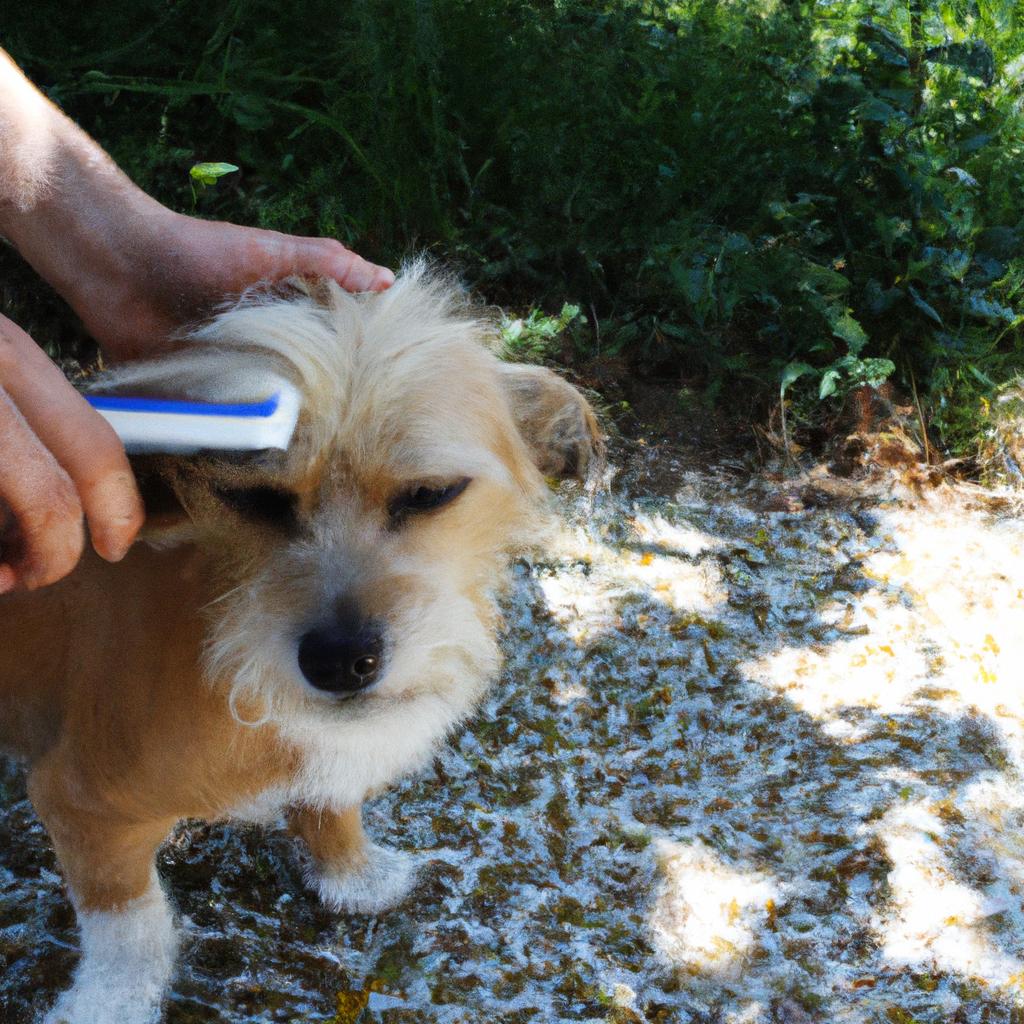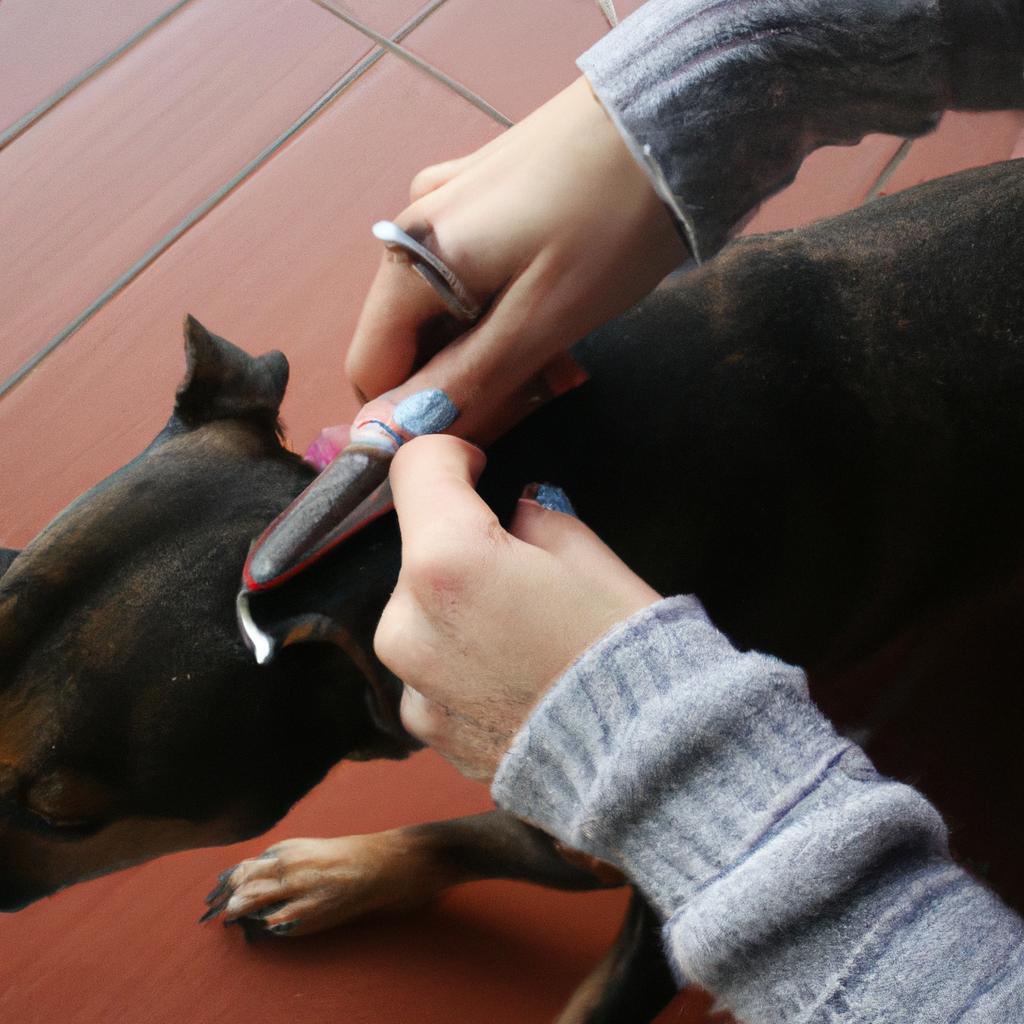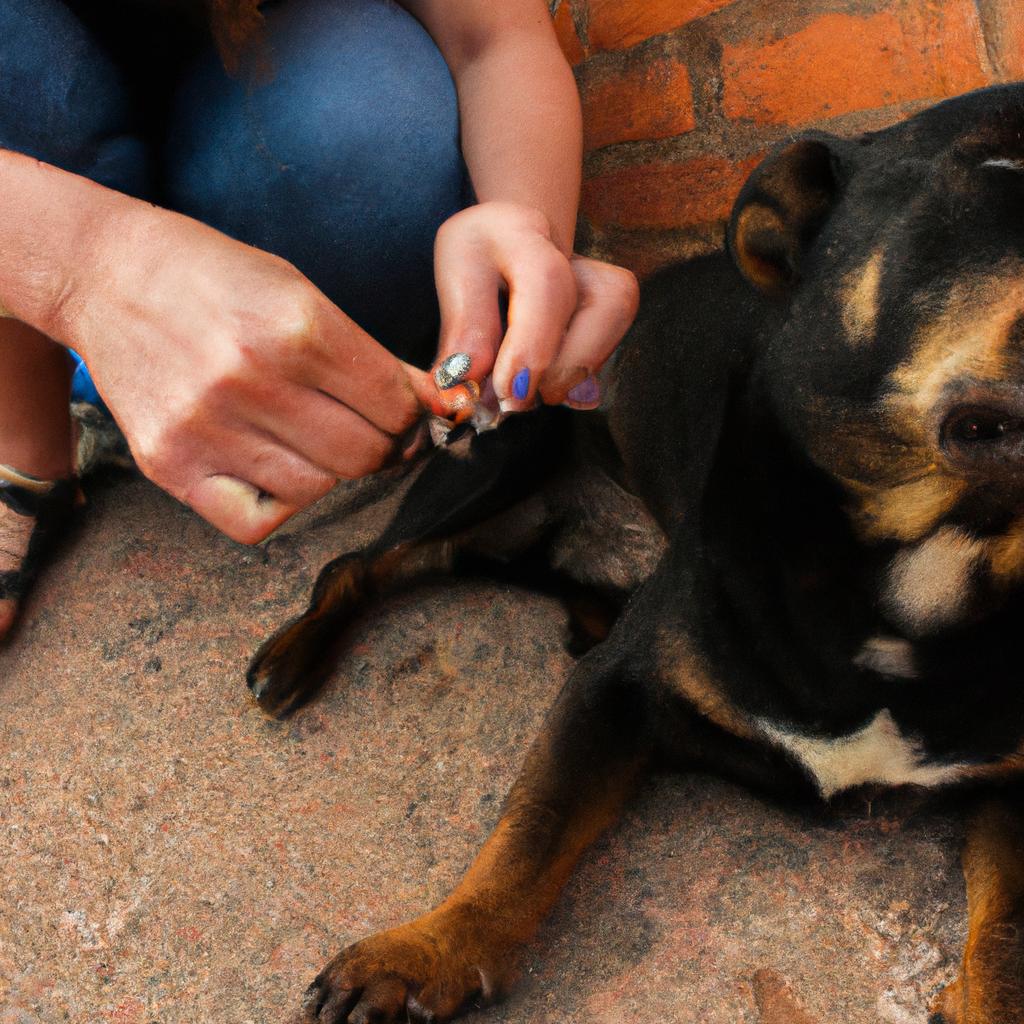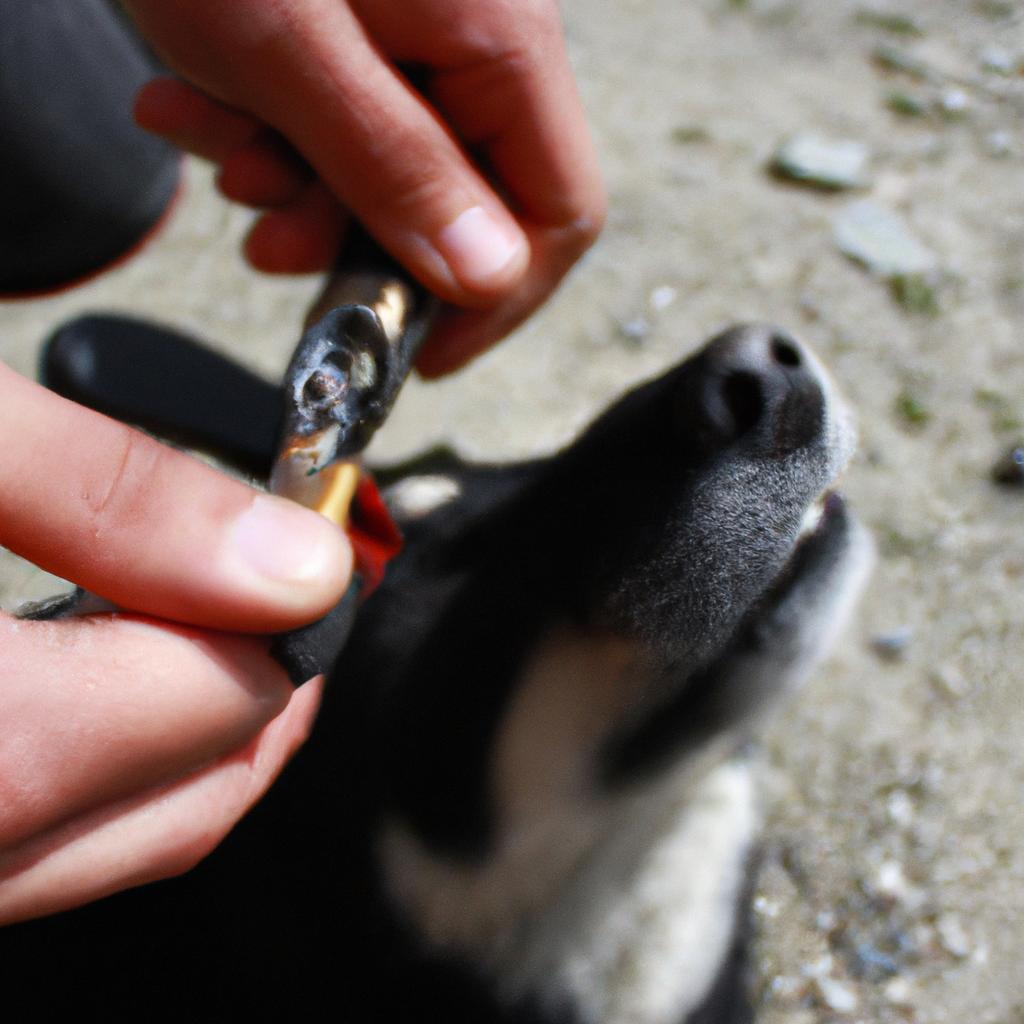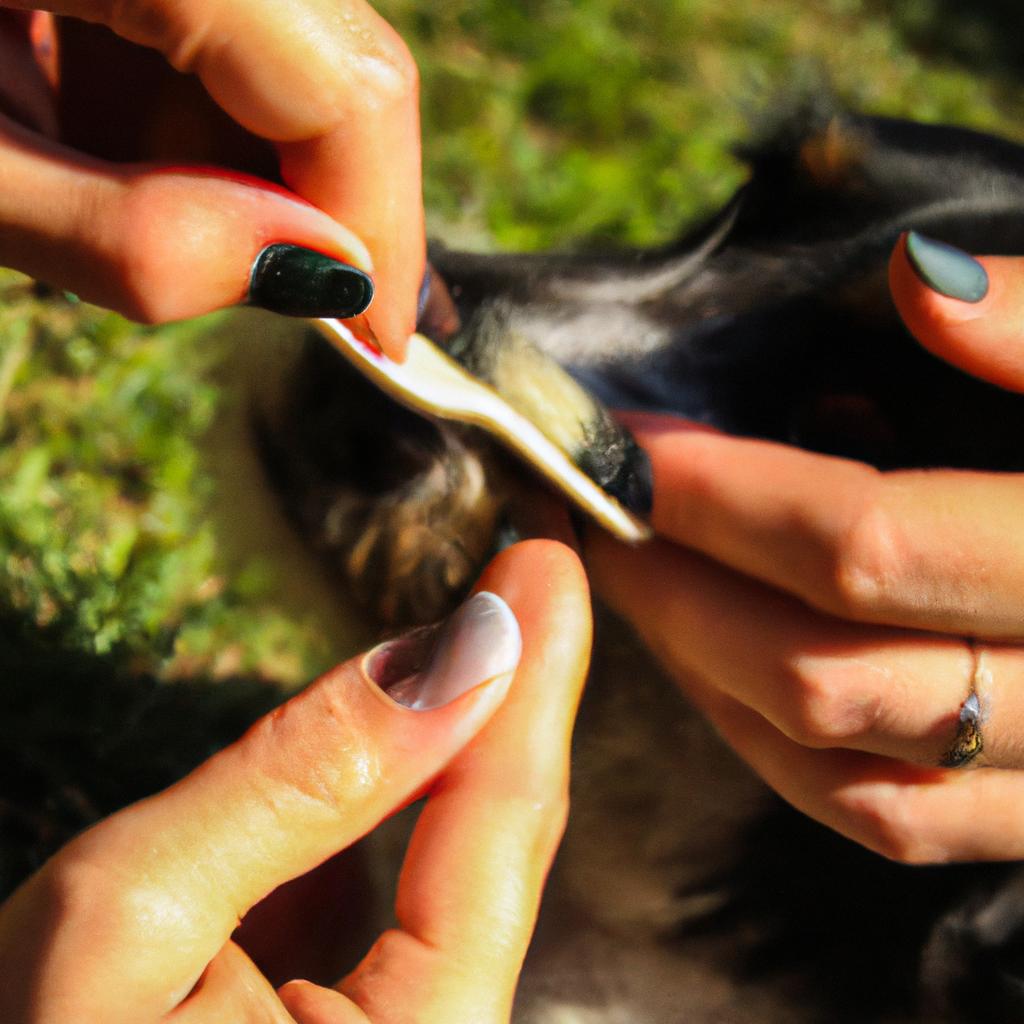Teeth Cleaning in Dog Grooming Salon: Informative Guide for Nail Trimming.
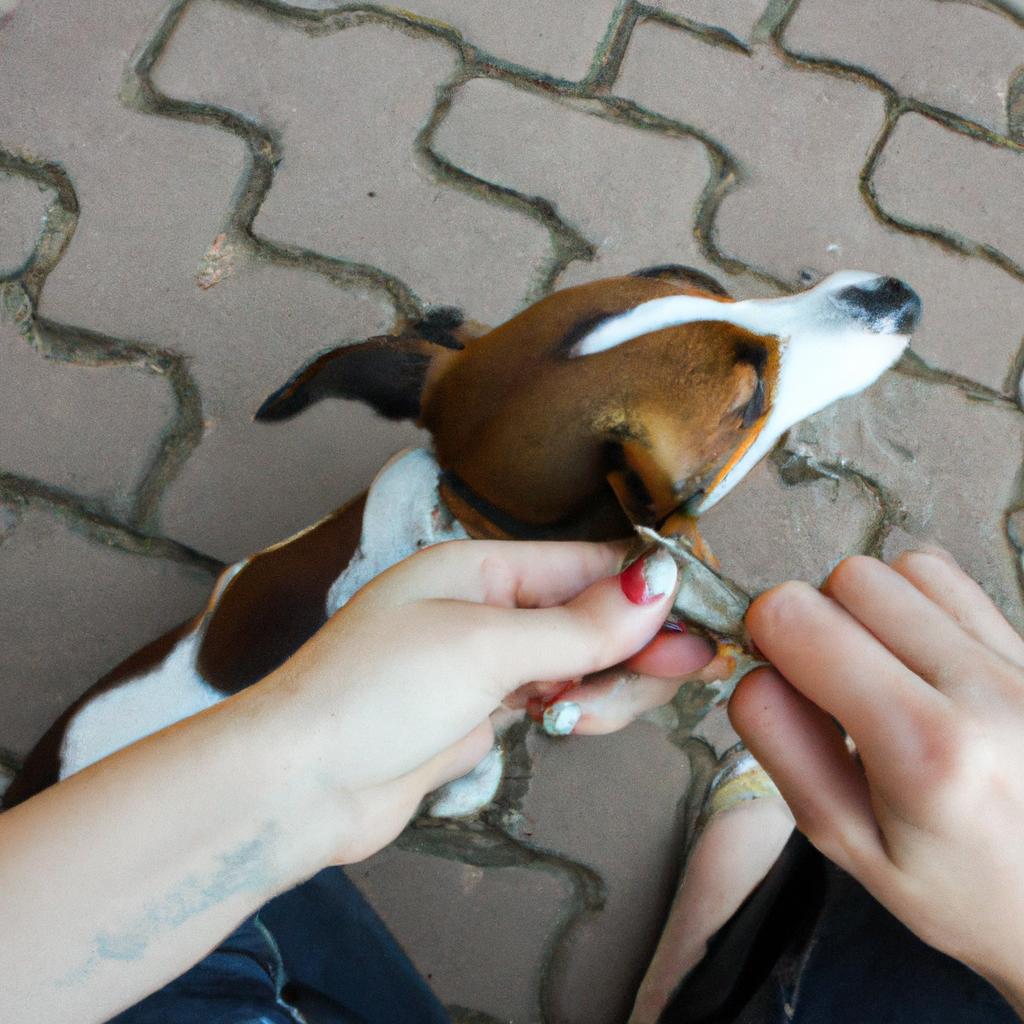
Dog grooming is an essential aspect of maintaining a dog’s overall health and well-being. Among the various procedures involved in grooming, teeth cleaning plays a crucial role in preventing dental issues and promoting oral hygiene in dogs. For instance, consider a hypothetical scenario where a dog named Max undergoes regular nail trimming at his local grooming salon but neglects proper teeth cleaning. Over time, this could lead to plaque buildup, gum disease, and other oral problems that may affect Max’s overall health. Therefore, understanding the importance of teeth cleaning in dog grooming salons becomes imperative for both pet owners and groomers alike.
In order to provide comprehensive care for dogs during their grooming sessions, it is vital to recognize the significance of including teeth cleaning as part of the routine. Neglecting dental care can have adverse effects on a dog’s overall health and may even result in serious medical conditions. Plaque accumulation can lead to gum inflammation (gingivitis) or periodontal disease if left untreated. These conditions not only cause discomfort but also put dogs at risk of developing infections that can spread throughout their bodies via the bloodstream. Moreover, poor oral hygiene has been linked to systemic diseases such as heart disease and kidney problems in dogs. Hence, incorporating effective teeth cleaning practices into the regular grooming routine is crucial for maintaining a dog’s overall health and preventing potential dental and systemic issues.
To ensure proper teeth cleaning during grooming sessions, groomers should use appropriate tools and techniques. This may include using a dog-specific toothbrush and toothpaste to gently brush the dog’s teeth, focusing on all surfaces, including the back molars. Groomers should also pay attention to any signs of dental problems such as bad breath, excessive drooling, swollen gums, or loose teeth. If any concerns are identified, it is important to inform the pet owner so that they can seek veterinary care if necessary.
Additionally, groomers can provide recommendations and guidance to pet owners regarding at-home dental care for their dogs. This may include suggestions for suitable dental treats or toys that promote oral health and help control plaque buildup. Educating pet owners about the importance of regular teeth cleaning and providing them with resources on how to properly maintain their dog’s oral hygiene can greatly contribute to their overall well-being.
In conclusion, incorporating teeth cleaning into dog grooming sessions is essential for maintaining a dog’s oral health and preventing potential dental issues. By recognizing its significance and implementing effective cleaning practices, both groomers and pet owners can contribute to the overall well-being of dogs in their care.
Why Teeth Cleaning is Important for Dogs
Why Teeth Cleaning is Important for Dogs
Imagine a scenario where you bring your beloved furry friend, Max, to the dog grooming salon. As he happily jumps onto the table, the groomer notices that his teeth are covered in tartar and plaque buildup. This situation is not uncommon among dogs and highlights the importance of regular teeth cleaning.
Proper dental care plays a crucial role in maintaining a dog’s overall health and well-being. Neglecting their oral hygiene can lead to various dental issues, such as gum disease, tooth decay, and bad breath. Just like humans, dogs require routine dental maintenance to prevent these problems from escalating into more serious conditions.
To emphasize the significance of teeth cleaning for dogs, consider the following bullet points:
- Regular brushing helps remove food particles and bacteria that accumulate on teeth.
- Professional cleanings performed by trained groomers or veterinarians ensure thorough removal of plaque and tartar.
- Dental examinations during grooming sessions allow early detection of potential dental problems.
- Implementing preventive measures minimizes the risk of costly veterinary procedures in the future.
| Benefits of Teeth Cleaning for Dogs |
|---|
| 1 |
| 2 |
| 3 |
| 4 |
By prioritizing your dog’s dental care through regular teeth cleaning practices, you can enhance their quality of life and potentially extend their lifespan. It is essential to recognize that oral health is an integral part of a comprehensive grooming routine.
Transitioning seamlessly into our next section about “Common Dental Issues in Dogs,” let us explore how neglecting proper dental care can contribute to significant health concerns for our canine companions.
Common Dental Issues in Dogs
Section H2: Common Dental Issues in Dogs
Understanding the importance of teeth cleaning in dogs, let us now delve into some common dental issues that can arise if proper oral hygiene is not maintained. By exploring these conditions, we can gain a better understanding of why regular teeth cleaning should be an essential part of your dog’s grooming routine.
Paragraph 1:
To illustrate the potential consequences of neglecting dental care, consider the case of Max, a seven-year-old Labrador Retriever. Despite receiving regular check-ups and vaccinations, Max had never undergone professional teeth cleaning. Over time, plaque and tartar accumulated on his teeth, leading to gum inflammation and bad breath. Eventually, Max developed periodontal disease, which required extensive treatment by a veterinarian. This example serves as a stark reminder of how poor dental hygiene can significantly impact a dog’s overall health.
Paragraph 2:
Dental problems are prevalent among dogs due to various factors such as genetics, diet choices, and inadequate oral care routines. Here are some commonly encountered dental issues in dogs:
- Periodontal Disease: The most common dental condition where bacteria-filled plaque forms along the gumline.
- Tooth Decay: Similar to humans, dogs can also experience tooth decay caused by bacterial action.
- Gingivitis: Inflammation of the gums resulting from accumulation of plaque and tartar.
- Broken or Fractured Teeth: Dogs may break their teeth while chewing hard objects or during accidents.
Bullet Point List (markdown format):
These dental issues have several implications for your furry friend’s well-being:
- Pain and Discomfort
- Difficulty eating
- Increased risk of systemic infections
- Potential organ damage
Paragraph 3:
Recognizing these potential complications emphasizes the need for proactive oral care measures like regular visits to a dog grooming salon for professional teeth cleaning. By addressing dental issues promptly and effectively, you can enhance your dog’s quality of life and prevent further complications associated with poor oral health.
With a clear understanding of common dental problems in dogs, let us now explore the many benefits that professional teeth cleaning can provide for your furry companion.
The Benefits of Professional Teeth Cleaning
Section H2: Common Dental Issues in Dogs
Transition: Having explored the common dental issues that can affect dogs, it is important to understand the benefits of professional teeth cleaning. This section will focus on highlighting the advantages and reasons why pet owners should consider opting for this service.
To illustrate the significance of professional teeth cleaning, let’s consider a hypothetical scenario. Meet Max, an adorable Golden Retriever who has been experiencing bad breath and difficulty eating due to neglected oral hygiene. His owner decides to take him to a dog grooming salon for a thorough teeth cleaning session. The results are remarkable – not only does Max regain his fresh breath but also experiences improved overall health and enhanced quality of life.
Here are some key reasons why professional teeth cleaning is beneficial for your furry friend:
- Prevents periodontal disease: Regular cleanings can help prevent gum diseases such as gingivitis or periodontitis, which can lead to pain, tooth loss, and even systemic infections.
- Removes tartar buildup: Expert groomers use specialized tools to remove stubborn tartar that regular brushing may miss, reducing the risk of decay and cavities.
- Identifies underlying issues early: During a thorough examination, professionals carefully inspect your dog’s mouth for any signs of abnormalities like broken teeth or tumors, allowing for prompt treatment if required.
- Promotes overall well-being: Good oral health contributes to better digestion by ensuring proper chewing and swallowing abilities; it also reduces the likeliness of bacteria entering the bloodstream and affecting vital organs.
- Say goodbye to foul-smelling breath!
- Give your pup relief from pain caused by dental problems.
- Enhance your dog’s overall comfort while eating.
- Ensure your beloved companion enjoys a happier and healthier life.
Emotional table:
| Benefit | Emotional Response |
|---|---|
| Fresher breath | Delight and satisfaction |
| Improved oral comfort | Relief and contentment |
| Enhanced quality of life | Happiness and joy |
| Peace of mind for pet owners | Confidence and reassurance |
Understanding the benefits of professional teeth cleaning sets the foundation for implementing proper dental care. In the subsequent section, we will delve into a step-by-step guide to teeth cleaning in a dog grooming salon, ensuring you have all the knowledge required to provide this essential service for your furry companion.
[Continue with “Step-by-Step Guide to Teeth Cleaning in a Dog Grooming Salon” section]
Step-by-Step Guide to Teeth Cleaning in a Dog Grooming Salon
Now that we have discussed the importance of professional teeth cleaning for our furry friends, let’s delve into the step-by-step guide to teeth cleaning in a dog grooming salon. But first, allow me to share a real-life example that highlights the significance of this procedure.
Meet Max, a lovable Labrador Retriever who had been experiencing bad breath and difficulty chewing his food. Concerned about his oral health, Max’s owner decided to take him to a dog grooming salon for professional teeth cleaning. The results were remarkable – not only did Max regain his fresh breath, but he also showed an improvement in overall dental health.
To ensure a successful teeth cleaning session at the salon, it is essential to follow these steps:
-
Preparing the Dog: Before beginning the procedure, groomers should make sure that the dog is calm and comfortable. This may involve gentle handling and using positive reinforcement techniques such as treats or praise.
-
Visual Examination: Groomers will carefully examine the dog’s mouth for any signs of dental issues like plaque buildup, gum inflammation, or broken teeth. This helps identify specific areas that require extra attention during the cleaning process.
-
Scaling and Polishing: Using specialized tools, groomers will remove tartar and plaque from the dog’s teeth through scaling. They will then proceed with polishing to smoothen any rough surfaces on the enamel, making it more difficult for bacteria to adhere.
-
Post-Cleaning Evaluation: After completing the cleaning process, groomers will assess whether further treatment is necessary or if additional preventive measures need to be implemented. They may recommend regular brushing at home or suggest occasional follow-up visits for maintenance purposes.
By opting for professional teeth cleaning services in a dog grooming salon, pet owners can provide their beloved companions with numerous benefits:
- Enhanced Dental Health: Regular cleanings help prevent periodontal disease by removing harmful bacteria and reducing plaque buildup.
- Fresh Breath: Cleaning removes the source of bad breath, leaving dogs with fresher-smelling mouths.
- Improved Overall Health: Periodontal disease can contribute to various health issues, such as heart and kidney problems. By maintaining good oral hygiene, pet owners can help safeguard their furry friends’ overall well-being.
- Professional Expertise: Groomers are trained in dental care techniques specific to dogs, ensuring a thorough and safe cleaning process.
| Benefits of Professional Teeth Cleaning |
|---|
| Enhanced Dental Health |
| Fresh Breath |
| Improved Overall Health |
| Professional Expertise |
In summary, professional teeth cleaning in a dog grooming salon offers numerous advantages for our canine companions. By following a systematic approach and relying on expert knowledge, groomers can ensure optimal dental health outcomes.
Now that we understand the benefits of professional teeth cleaning, let’s move on to exploring recommended products for at-home teeth cleaning.
Recommended Products for At-Home Teeth Cleaning
Teeth Cleaning in Dog Grooming Salon: Informative Guide for Nail Trimming
Step-by-Step Guide to Teeth Cleaning in a Dog Grooming Salon (Continued)
Once the initial preparations are complete, it is time to begin the teeth cleaning process itself. The groomer will usually start by gently restraining the dog, ensuring their safety and comfort throughout the procedure. In some cases, sedation may be required if the dog becomes anxious or aggressive during dental care.
Next, the groomer will use specialized tools designed specifically for canine teeth cleaning. These tools may include toothbrushes with soft bristles and specially formulated toothpaste made for dogs. It is important to note that human toothpaste should never be used on dogs as it can contain harmful ingredients such as xylitol which is toxic to them.
During the teeth cleaning process, the groomer will carefully brush each of your dog’s teeth, paying close attention to any signs of plaque buildup or gum disease. They may also use a scaler tool to remove stubborn tartar deposits from hard-to-reach areas. Additionally, some groomers offer additional services like mouth rinses or dental sprays that help maintain oral hygiene and fresh breath.
To enhance your dog’s dental health between grooming salon visits, there are several products you can consider incorporating into their regular oral care routine:
- Dental chews: These treats are designed to promote chewing action that helps reduce plaque and tartar buildup.
- Water additives: Adding specific dental water additives to your dog’s drinking water can help fight bacteria and keep their breath fresh.
- Dental wipes: These convenient wipes offer an easy way to clean your dog’s teeth and gums without requiring brushing.
- Chew toys: Certain chew toys are specifically designed to provide mechanical scrubbing action against your dog’s teeth.
| Product Name | Benefits | Price Range |
|---|---|---|
| Dental chews | Promotes chewing action, reduces plaque buildup | $5-$20 |
| Water additives | Fights bacteria, freshens breath | $10-$25 |
| Dental wipes | Convenient alternative to brushing | $8-$15 |
| Chew toys | Mechanical scrubbing action against teeth | $5-$30 |
By regularly incorporating these products into your dog’s dental care routine, you can help maintain their oral health and reduce the risk of common dental issues.
Tips for Maintaining Your Dog’s Dental Health (Transition Sentence)
Now that we have covered the step-by-step guide to teeth cleaning in a dog grooming salon and recommended at-home products, let us delve into some valuable tips for maintaining your furry friend’s dental health.
Tips for Maintaining Your Dog’s Dental Health
Maintaining Your Dog’s Dental Health
Now that you have learned about the recommended products for at-home teeth cleaning, let us explore some essential tips to help you maintain your dog’s dental health. By following these guidelines, you can ensure that your furry friend enjoys a healthy mouth and overall well-being.
Proper Brushing Technique: One of the most effective ways to prevent dental issues in dogs is through regular brushing. To get started, choose a soft-bristled toothbrush specifically designed for dogs and toothpaste formulated for pets. Gently introduce the toothbrush into your dog’s routine by allowing them to sniff and taste it before commencing brushing. Use circular motions along both sides of their teeth, focusing on the gumline where plaque tends to accumulate. Aim to brush your dog’s teeth at least two or three times per week.
Dietary Considerations: Just like humans, what our canine companions eat significantly impacts their oral health. Incorporating certain food items into their diet can promote good dental hygiene. Here are some suggestions:
- Crunchy fruits and vegetables such as carrots and apples provide natural abrasion against plaque.
- Raw bones (supervised) act as a natural toothbrush, helping scrape away tartar buildup.
- Specialized dental chews can aid in preventing plaque formation while catering to your pup’s chewing needs.
- High-quality dry kibble helps reduce the accumulation of plaque compared to wet food options.
Regular Veterinary Check-ups: In addition to home care practices, scheduling regular check-ups with your veterinarian is vital for maintaining optimal dental health for your dog. During these visits, veterinarians can perform professional cleanings known as scaling and polishing, addressing any underlying concerns effectively. They may also conduct thorough examinations to identify potential signs of periodontal disease or other dental problems early on.
To further highlight the significance of proper dental care for dogs, consider the following emotional response evoking bullet points:
- A healthy mouth leads to a happier dog, free from the discomfort of dental issues.
- Neglecting oral health can result in more severe medical conditions, leading to increased veterinary expenses.
- Regular teeth cleaning promotes fresh breath and enhances your dog’s overall well-being.
- By prioritizing dental care, you are investing in your furry friend’s long-term quality of life.
Furthermore, take a look at the table below for an overview of common signs indicating potential dental problems in dogs:
| Dental Problem | Signs and Symptoms |
|---|---|
| Periodontal disease | Bad breath, inflamed gums |
| Tooth decay | Visible holes or discoloration |
| Oral tumors | Difficulty eating or swallowing |
| Fractured tooth | Chipped enamel or exposed nerves |
By being proactive about your dog’s dental health through regular brushing, dietary considerations, and veterinary check-ups, you can ensure their continued happiness and overall well-being. Remember that prevention is key when it comes to maintaining optimal oral hygiene for our beloved four-legged companions.

